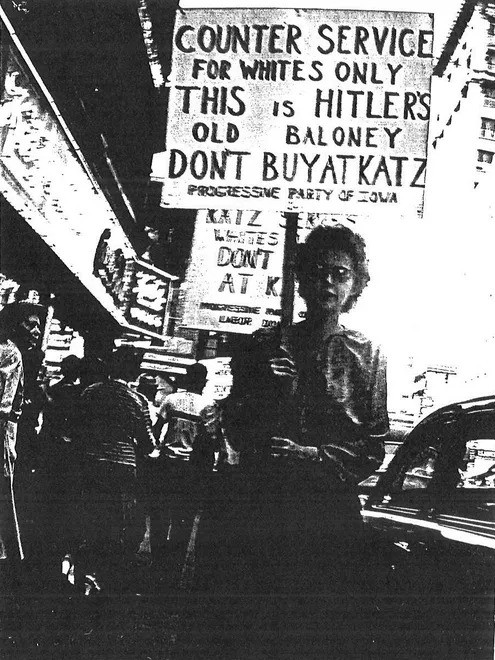The Katz Drugstore Protests in Des Moines, Iowa, began on July 7, 1948, when Edna May Griffin, John Bibbs, Leonard Hudson, and Griffin’s one-year-old daughter, Phyllis Griffin, entered the Katz Drug Store to eat at the lunch counter. The group was refused service because they were Black, leading Griffin to launch a protest against Katz’s racial discrimination practice. Her protest eventually resulted in a lawsuit filed by the State of Iowa, The State of Iowa v. Katz. The lawsuit came before an all-White jury that found the owner of Katz Drug Store, Maurice Katz, and the store manager, C.L. Gore, guilty of racial discrimination. They were fined $50 by the court.
Edna Griffin, her daughter Phyllis, John Bibbs, and Leonard Hudson entered the Katz Drugstore, located at the intersection of 7th and Locust streets in downtown Des Moines, because it had long been a symbol of local racial discrimination despite such discrimination being illegal in Iowa. The group entered Katz’s around 3:45 p.m. They took their seats at the lunch counter, and a waitress approached them to take their order for ice cream. As the waitress walked to the ice cream dispenser, store manager C.L. Gore came out and whispered something in the waitress’s ear. She then returned to the group and told them that she could not serve them because of their race.
While Edna Griffin persuaded Bibbs and Hudson to join her in the initial protest, that first sit-in demonstration led her to organize a powerful collective effort that eventually included dozens of Black and white protestors, including many belonging to the Progressive Party, which that year was mounting an independent presidential campaign led by Henry Wallace, the Iowa-born former Vice President in the Franklin Roosevelt Administration. While Progressive Party members were adamant opponents of racial segregation and supported the protests, it was Griffin who spearheaded the months-long campaign that included boycotts, sit-ins, and pickets against Katz and other lunch counters around Des Moines.
Together with Bibbs and Hudson, Griffin also filed a civil lawsuit against Katz. The three were represented by local attorneys and Des Moines NAACP members Charles Howard and Henry McKnight. The Polk County Attorneys separately prosecuted the Katz owner, Maurice Katz, bringing criminal charges under the 1884 Iowa Civil Rights Act, which prohibited discrimination in public accommodations.
Griffin’s testimony against Katz in the criminal case, State v. Katz, which ended in December 1949, was a pivotal moment in the fight for civil rights. First, the Katz Drug Store and store manager Gore were found guilty of practicing racial discrimination by an all-white jury and fined $50, while Griffin was awarded $1 in damages. On December 2, 1949, attorneys Howard and McKnight separately negotiated a successful agreement to end Katz’s discriminatory practices. Katz settled out of court, agreeing to pay $1,000 and to end the store’s discriminatory practices. The Iowa Supreme Court upheld the conviction on December 13, 1949.
Do you find this information helpful? A small donation would help us keep this available to all. Forego a bottle of soda and donate its cost to us for the information you just learned, and feel good about helping to make it available to everyone.
BlackPast.org is a 501(c)(3) non-profit and our EIN is 26-1625373. Your donation is fully tax-deductible.
“Des Moines Katz Drugstore Protests,” State Historical Society of Iowa, https://history.iowa.gov/sites/default/files/history-education-pss-equality-edna-transcription.pdf; “Des Moines Katz Drugstore Protests,” Zinn Education Project, https://www.zinnedproject.org/news/tdih/edna-griffin-denied-service; “Des Moines Katz Drugstore Protests,” We Are Iowa, https://www.weareiowa.com/article/news/history/des-moines-civil-rights-activist-1948-edna-griffin-black-history-katz-drug-store-sitin/524-c7436bcc-3f33-4f6d-94f2-3f2996bec8e3.

